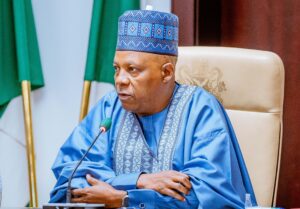
Rising debt profile raises sustainability concerns — CPPE
…As Yusuf charges FG to reverse payment of gas in dollars
An economist and the Chief Executive Officer of the Centre for the Promotion of Private Enterprise, Dr Muda Yusuf, has said that the increasing debt profile of the government raises some sustainability concerns.
He also charged the federal government to rescind the decision of reversing payment on gas in Dollars.
Yusuf, who is a former Director-General of the Lagos Chamber of Commerce and Industry, said, “The rising debt profile of the government raises serious sustainability concerns. Although the government tends to argue that the condition is not a debt problem, but a revenue challenge. But the truth is that debt becomes a problem if the revenue base is not strong enough to service the debt sustainably. It invariably becomes a debt problem.”
He also stressed the need to cut down expenditures and implement reforms that could reduce the costs of governance and ease the fiscal burden.
“What is needed is the political will to cut expenditure and undertake reforms that could scale down the size of government, reduce governance cost, and ease the fiscal burden on the government.
“It is imperative for the country to operate as a true federation which it claims to be. The unitary character of the country is making it difficult to unlock the economic potentials of the sub-nationals. It is perpetuating the culture of dependence on the federal government.
“It is necessary to scale down the size of government and cost of governance. Fiscal sustainability is driven by both cost and revenue. Therefore managing the major drivers of cost and revenue is imperative. As far as possible, the government should push back in sectors or activity areas where the private sector has the capacity to deliver desired outcomes. We should see more concessions and privatisations at all levels of government,” he said.
He added that the debts, which should be concessionary, should be used to strictly fund capital projects that would boost the productive capacity of the economy.
“It is important to ensure that the debt is used strictly to fund capital projects that would strengthen the productive capacity of the economy. This is the position of the Fiscal Responsibility Act.
“Additionally, emphasis should be on concessionary financing, as opposed to commercial debts which are typically very costly,” he added.
Dr. Muda Yusuf has advised the federal government to take urgent steps to address the country’s energy crises saying that energy cost cost is one of the biggest challenges facing investors in the Nigerian economy.
Yusuf, former Director General of the Lagos Chamber of Commerce and Industry, LCCI, said, “If we must reduce the cost of production for manufacturers, then reducing energy cost becomes very critical.”
According to him, Manufacturers have complained about high cost of gas and also worried about availability, adding, “There is also the added challenge of having to pay for the gas in dollars. This is inequitable and needs to be urgently corrected. It is unfair to demand for payment for gas by industrialists in foreign currency when manufacturers are selling their products in naira.”
He also noted that it is against the extant regulation and policy of the Central Bank of Nigeria, CBN on payment for domestic transactions and therefore requested an urgent intervention by the government to correct this anomaly.
He said, “There is also the acute shortage and phenomenal spike in the cost of cooking gas. It is a paradox that as a leading exporter of gas in Africa, there is no framework to ensure adequate supply of gas to domestic market. Again, we request that this irregularity be corrected.”



